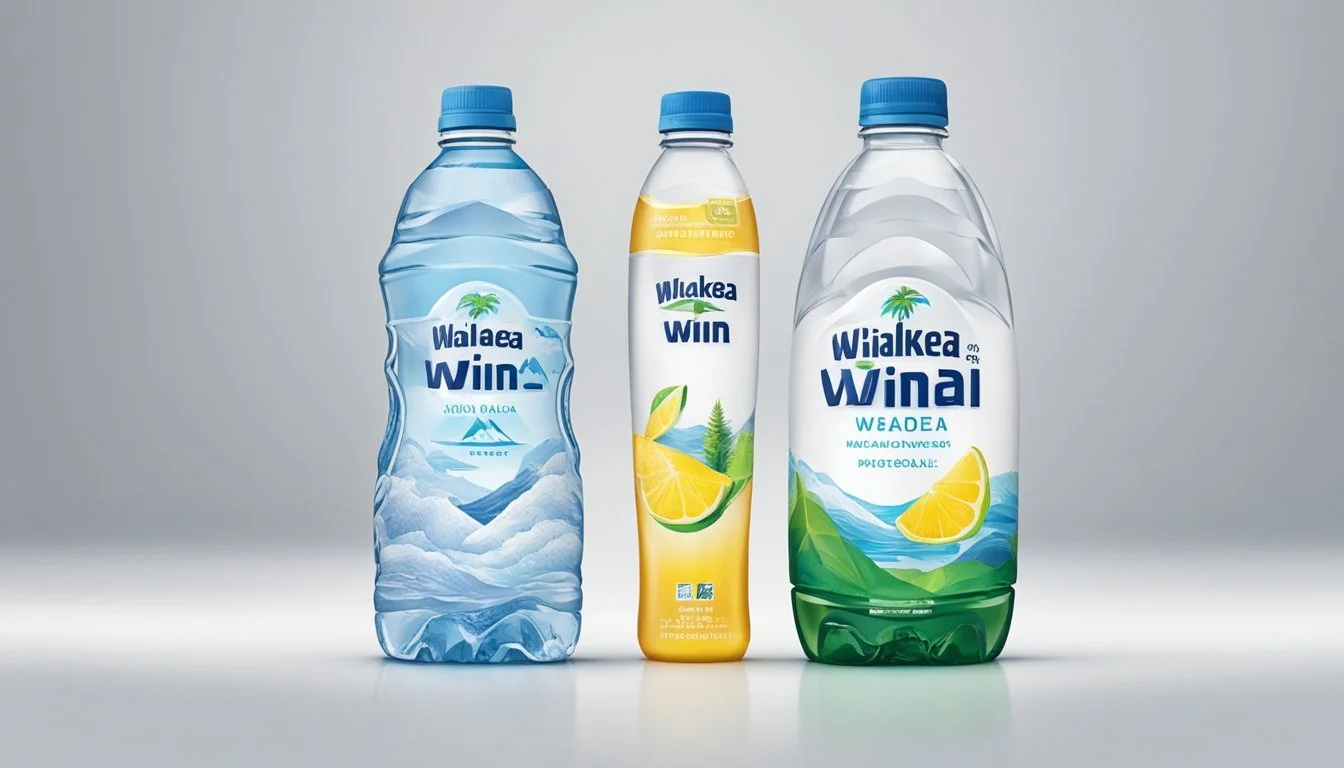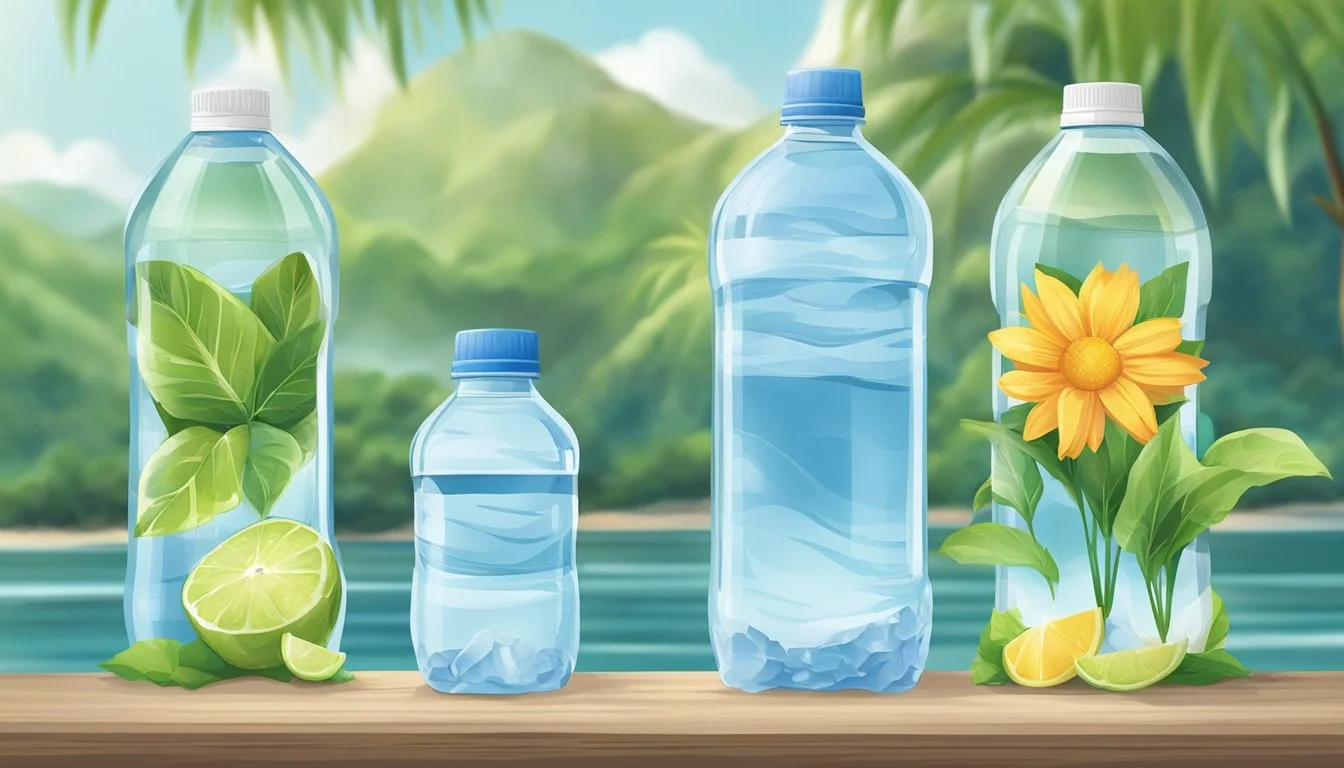Waiakea vs. Big Win
A Comparative Analysis of Bottled Water Quality
Choosing between Waiakea and Big Win bottled water requires a close look at taste, health benefits, and overall value. Waiakea, sourced from Hawaiian volcanic rock, offers a unique taste profile that many find refreshing. Its alkaline properties and added minerals also contribute to potential health benefits.
Big Win, often more affordable, provides a standard hydration option without the added health perks of Waiakea. For those prioritizing health and sustainability, Waiakea stands out as the better choice.
However, if cost and accessibility are the primary concerns, Big Win remains a practical alternative. Each brand has its strengths, and the best choice depends on individual preferences and priorities.
Understanding Bottled Water
In the realm of bottled water, understanding its various types, health implications, and environmental impacts can assist consumers in making informed choices regarding their hydration.
Types of Bottled Water
Bottled water comes in several varieties, each distinguished by its source and treatment process. Spring water originates from underground formations and is collected at the spring or via a borehole tapping the underground source. It maintains the mineral content present at the source.
Mineral water, another category, contains minerals and trace elements. It is sourced from protected underground reservoirs and is not subject to further treatment beyond the removal of unstable elements.
Purified water is produced by processes such as distillation, deionization, or reverse osmosis, eliminating impurities and ensuring a high level of purity. Compared to tap water, purified water undergoes extra filtration to remove contaminants that might linger in municipal supplies.
Health Implications of Bottled Water
The health benefits of bottled water often stem from its source and processing methods. Mineral water is rich in essential minerals like calcium, magnesium, and potassium, which can bolster physical health. These minerals support bone health, cardiovascular function, and electrolyte balance.
Alkaline bottled water, such as Waiakea, with a higher pH, claims to offer antioxidant properties, aiding in neutralizing free radicals. While not all alkaline waters provide significant health benefits, those with naturally occurring minerals can be advantageous.
Conversely, not all bottled waters are beneficial. Some may have differences in mineral content, which influences their health contributions. Consumers should be aware of the specific contents and benefits of each type to make the best choice for their health needs.
Environmental Impact of Bottled Water
Bottled water has a significant environmental footprint, primarily due to packaging and transportation. PET bottles are commonly used, although rPET (recycled PET) and glass bottles are growing in popularity as eco-friendly alternatives. These materials have varied impacts on sustainability.
The production and disposal of plastic bottles contribute to pollution and carbon emissions. Efforts to use rPET and other recyclable materials aim to reduce this impact, but challenges remain in ensuring widespread recycling.
Consumers and manufacturers are increasingly focusing on reducing the carbon footprint associated with bottled water. Responsible packaging and sourcing practices are essential. By choosing environmentally friendly options and supporting companies committed to sustainability, individuals can help mitigate the adverse effects on the environment.
Comparing Waiakea and Big Win
Waiakea and Big Win are two distinct bottled water brands, each with its unique origin, source, filtration process, and emphasis on health and sustainability.
Brand Origin and Philosophy
Waiakea originates from Hawaii and is known for its commitment to health, sustainability, and ethical practices. Its philosophy revolves around providing naturally alkaline volcanic water while minimizing environmental impact.
Big Win, on the other hand, is a more commercial brand available in numerous retail locations. Its philosophy primarily focuses on delivering affordable, purified bottled water to a broader market.
Source and Filtration Process
Waiakea's water source is an aquifer in Hawaii, where it undergoes natural volcanic filtration. This natural process enriches the water with minerals before it is bottled at a pH level of 7.6 to 8.2.
Big Win sources its water from various locations and utilizes standard purification processes like reverse osmosis and micro-filtration. This ensures consistency and purity in the water but lacks the natural mineral infusion process found in Waiakea.
Mineral Content and pH Levels
Waiakea water boasts a naturally alkaline pH of 8.8, thanks to its volcanic origin. The high pH helps neutralize acidity in the body. Additionally, it contains essential minerals and electrolytes, giving it a smooth and slightly sweet taste.
Big Win water typically has a neutral pH, around 7. It undergoes processes to ensure purity but may not have the naturally occurring minerals found in volcanic water sources. This results in a more straightforward taste profile.
Health Benefits and Hydration
Waiakea's high alkalinity and mineral-rich composition offer various health benefits. The natural electrolytes and minerals can aid in hydration and support bodily functions. Its slightly sweet taste might also encourage increased water intake.
Big Win primarily focuses on hydration through purified water. While it ensures clean drinking water, it may not offer the same level of health benefits as mineral-rich, naturally alkaline options like Waiakea.
Sustainability and Ethical Practices
Waiakea emphasizes sustainability through eco-friendly practices, including using 100% recycled plastic for its bottles and contributing to clean water initiatives globally. Its ethical practices also involve minimizing carbon footprint and promoting social responsibility.
Big Win, being a mass-market brand, may not have the same level of commitment to sustainability and ethical practices. Its large-scale production focuses more on meeting demand and keeping costs low, potentially at the expense of environmental considerations.
Taste and Purity
When comparing Waiakea and Big Win bottled waters, the taste profile and purity levels are essential considerations. These factors impact consumer preferences and the overall drinking experience.
Taste Profiles and Preferences
Waiakea water originates from Hawaii, and its volcanic filtration process provides a naturally alkaline pH range of 7.6 to 8.2. This results in a slightly sweet and mineral-rich taste that some describe as smooth and refreshing.
In contrast, Big Win water, typically purified through reverse osmosis, has a neutral pH of around 7.0. Its taste is more straightforward and clean, often described as neutral, without the distinct mineral complexity found in naturally sourced waters.
Taste preferences for these waters will vary among individuals. Some may prefer Waiakea's unique taste due to its volcanic minerals, while others may lean towards Big Win for its simplicity and everyday hydration suitability.
Purity and Contaminant Levels
Waiakea positions itself as an eco-friendly and pure choice, emphasizing its natural filtration process. This ensures low levels of contaminants like sodium, chlorine, and lead. The water is also rich in beneficial minerals, including calcium, magnesium, and potassium.
Big Win, being a purified water brand, undergoes rigorous treatment processes to remove impurities. This includes the elimination of potential contaminants such as chlorine and lead, ensuring safe drinking water.
However, the reverse osmosis process used by Big Win may also strip away beneficial minerals, resulting in a less mineral-rich profile compared to Waiakea. Each brand meets strict water quality standards, but Waiakea's natural sourcing may offer a slight edge in perceived purity.
Nutritional Analysis
A comparison of Waiakea and Big Win bottled waters reveals differences in their electrolyte and mineral content, as well as their pH balances. These factors can affect hydration, bodily functions, and overall health.
Electrolytes and Mineral Benefits
Waiakea water is sourced from volcanic rock in Hawaii. It contains electrolytes like calcium, magnesium, and potassium. These minerals are essential for muscle function, heart health, and maintaining fluid balance in the body. Calcium supports bone health, while magnesium is critical for enzymatic activities and muscle recovery.
Big Win, commonly available in many retail stores, lacks a detailed breakdown of its mineral content. It may contain minimal amounts of minerals and electrolytes compared to Waiakea. Consumers seeking specific health benefits from minerals might find Waiakea more beneficial due to its volcanic source and natural composition.
Comparison of pH Balance
Waiakea water has a naturally alkaline pH level ranging from 7.6 to 8.2, which helps neutralize acidity in the body. Alkaline minerals like bicarbonate and silica contribute to this pH balance. Higher pH levels are associated with better overall hydration and can support bodily functions like digestion and detoxification.
Big Win typically has a neutral to low pH level, closer to 7. Without the naturally occurring alkaline minerals found in Waiakea, it may not offer the same benefits in neutralizing body acidity or promoting mineral absorption. Those interested in maintaining an alkaline diet may prefer Waiakea for its higher pH and balanced mineral content.
More About Waiakea
Icelandic Glacial vs Waiakea: Which Bottled Water is Better?
Mountain Valley Spring Water vs Waiakea: Which Bottled Water is Better?
Waiakea vs Kirkland Signature: Which Bottled Water is Better?
Waiakea vs Richard's Rainwater: Which Bottled Water is Better?
Waiakea vs Whole Foods Italian Still Mineral water: Which Bottled Water is Better?
More About Big Win
Big Win vs Kirkland Signature: Which Bottled Water is Better?
Icelandic Glacial vs Big Win: Which Bottled Water is Better?
Mountain Valley Spring Water vs Big Win: Which Bottled Water is Better?
Richard's Rainwater vs Big Win: Which Bottled Water is Better?
Whole Foods Italian Still Mineral water vs Big Win: Which Bottled Water is Better?




